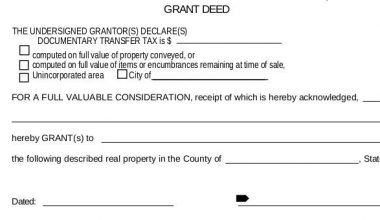What is fee simple in real estate? This means the ownership of a property without restrictions. However, there are forms to this type of freehold ownership and the forms include absolute and defeasible fee simple. This post will also place side-by-fee simple vs leasehold in order to point out the striking differences between them. If you need to know how a property can be owned through the fee simple form of ownership, especially in the US where it is very popular as well as compulsory for homeowners and people interested in owning property, then this post is for you.
What Is a Fee Simple Estate
Understanding what a fee simple estate is, you need to talk about real estate and matters relating to real estate. This is typically where you mention this term as the ultimate possession and use of land or estate without restrictions. However, you need to understand that the state set some regulations from time to time to check the use of these freeholds.
What a fee simple for the estate? It applies to the ownership of land and is also the dominant form of ownership in the United States. This is because most homes are purchased through this form of ownership. Furthermore, this is a legal term in real estate that means full and irrevocable ownership of land, and any buildings on the land.
This is also the highest form of ownership in real estate. This means that the ownership of this type of land or property is outright and without any limitations or restrictions. Expect than local zoning ordinances. It applies only to real estate, which includes land, immovable property, and any property directly attached, such as a building, road, pond, or machinery.
Fee Simple Estate
The term fee simple is derived from the word ”fief”. An English word in the old medieval era meant estate or land especially one under a feudal condition. The origin of this word birthed its meaning in recent times. Meanwhile, its significance in recent times is beyond what it used to be because you cant typically talk about owning a house without discussing this concept.
Let’s explain this concept better using this instance. When an individual sells land, now the land does not physically change hands because such a task would be impossible. But, unlike when someone sells a good (like food), which usually is handed to the purchaser. This is because the land is too big to physically transfer to the buyer. Now fee simple is typically purchasing this property and having full rights to use the property as you wish because you own it and your name is on the deed of the property.
There are various types of real estate interest in this type of ownership. Now, the type of interest you have in the agreement while purchasing the property will typically hinge on the nature and extent of ownership the buyer and seller will have on the land. For instance in apartments, the owners of individual units receive a form of ownership that gives them full legal rights subject to an agreement called a restrictive covenant. However, the owners share common rights for the use of public areas and also carry certain obligations toward its upkeep.
Fee Simple Estate Ownership
Discussing fee simple ownership in estates, means we are talking about the ownership of land and all the details of that land without restrictions. When you buy a house in the United States the deed is fee simple. Therefore, the house is not only in your name, you can use it however you like and can pass it down to whosoever you wish to when you die.
Fee simple ownership in real estate is very basic in the United States because all house owners have to have an idea about this term before purchasing a home. This type of ownership simply entitles a homeowner to the full right of a property, including the land and any structures that may be on the land. However, the limitation to this form of ownership implies zoning laws, deed or subdivision restrictions, and covenants. Most single-family homes fall under this type of ownership because the law recognizes fee simple ownership as the highest form of ownership in real estate.
Fee Simple in Real Estate
There are no limitations to durations in this type of ownership. This is because you can use and stay on the property as much as you want, and pretty much do whatever you like on the property. As long as you’re not breaking the laws which the state has placed or even infringing on public welfare. You’re free to use the property, sell it, rent it out, or leave it to your heir.
You will pay tax on the property’s value of your fee simple property or land, but you can also place encumbrances against it. Your free will on a fee simple property doesn’t mean that you can break laws. Because other people are free to place liens against your property if you fail to pay property taxes. Or even in a situation where a creditor gets a judgment against you for the money you owe them. This can pose a challenge to your property even though you owe them without restrictions or limitations. It can still be taken away from you if you don’t abide by the laws surrounding the ownership.
Fee Simple vs Leasehold
Fee simple is ownership is owning a property without restrictions while the opposite of this is leasehold which is why you always find fee simple and leasehold side by side often for instance ”fee simple vs leasehold”. Leasehold, however, means full access to a property but not ownership typically meaning that you pay to rent and there are restrictions as well.
While some are okay and happy with a leasehold, others want to own the property. This is the reason, why you need to properly understand the two terms and be able to differentiate them and make a better decision. Fee simple vs leasehold is a common topic in real estate. Because instructors continue to emphasize their differences to real estate investors to avoid mistakes and misconceptions.
Leasehold ownership provides you with access to a property, but you don’t own it. You have the full rights to use the premises, but you don’t typically own the home, so you can’t rent it or leave it to your heirs in your will like in fee simple. There are restrictions on tenants in a leasehold, some of them include prohibiting pets, no parties, or blaring music. Also, when a lease reaches its end date, the property automatically reverts back to the owner.
Understanding Fee Simple and Leasehold
Leasehold ownership does not only apply to property, it can be in form of land. For instance, you can have the right to cultivate on certain acres of land that is typically not yours. You could rent it from the owner for an agreed number of years. Although you can use the land on leasehold for your agricultural purposes, you can’t enjoy the same freedoms that you would if the land is typically yours. This is also called a rental agreement.
Between fee simple vs leasehold, there are some slight similarities like access to the property and use of the property. However, there are striking differences between fee simple vs leasehold you should know:
Fee Simple vs Leasehold Differences
FEE SIMPLE
This is the full ownership of property or land without restrictions and other details of the fee simple include that it ;
- Provides full ownership of the property
- The owner can encumber property as collateral for loans
- The owner can leave property to heirs
- No restrictions other than actions that are outside the law
LEASEHOLD
Leasehold simply means having full access to land or property you don’t typically know because you pay rent to have these benefits and there are also restrictions to this use.
- Offers full access to the property, but not ownership
- The leasehold can not encumber the property
- A leaseholder has no right to leave property to heirs
- There can be subject to owners’ restrictions
Owned Fee Simple
Owned fee simple is the same thing as fee simple which is complete ownership of a property or land without limitations. You can say this means a deed that allows homeowners to have full domain over their property, as long as they follow laws regarding zoning, taxation, and criminal conduct.
When a fee simple property is owned by you, you have every access to that particular property also, under this ownership, a property owner can do whatever they choose with their land and building structures enjoying rights that come with any fee simple property.
Read Also: 401 K WITHDRAWAL HOME PURCHASE: 2023 Guide to Home Purchase
How Fee Simple Works
Fee simple works in various forms and these forms include;
Deeding: An owned fee simple estate can be in the form of a deed to other people. Although, with the owner acting as a grantor in a deed and the recipient acting as a grantee. These deeds can be to relatives or just commercial buyers.
Leasing: Fee simple ownership of a property means you can serve as a lessor and rent out the property to a lessee.
Encumbrances: This means you can borrow money against the value of their home, which effectively puts liens on the property. You can as well, negotiate easements, or the right to access your property without owning it. Such encumbrances can sully the title on a property, but they are permitted in fee simple real estate ownership.
Determinable Fee Simple
There are certain types of this ownership which include: defeasible and absolute types, with the names, you can tell their meanings and as well have a hinge for their slight differences. People often tend to mistake and confuse both types however, they are very different. However, we will be discussing determinable fee simple now. This is basically under the defeasible fee simple form of freehold ownership.
A fee simple defeasible is possessed minor limitations on a person’s ownership stake and these limitations often involve eminent domain, escheat, special taxation, police power, and covenants from a previous owner. For instance, when the original owner deeds a building and makes a stipulation his/ her property will always be in use as a schoolhouse and nothing else, these conditions are known as fee tails.
Legally, there are two types of fee simple defeasible ownership and they are fee simple determinable and fee simple subject to condition subsequent. Now when you want to talk about fee simple determinable, it takes one step further than defeasible. This is because if conditions of the property are violated, ownership of the property is automatically transferred back to the grantor and there is no further action necessary on their part.
Fee Simple Absolute
Fee simple determinable is the opposite of the absolute one and likewise, the most similar to the meaning of fee simple itself but more advanced. The absolute form of ownership like the term itself means the totality of the ownership of land just like its name implies ”absolute”.
The fee simple absolute ownership is the safest and most common form of ownership or status for a freehold estate holder and also, and owners in this form of ownership pay property taxes as well as follow local laws. Aside from paying property taxes and following local laws, they enjoy complete and absolute ownership of the property.
What is fee simple and fee tail?
The goal of a fee tail is to keep the estate in the family of the person receiving the property. As a result, the fee tail solely benefits the fee tail holder’s children. A real estate conveyance known as a fee simple absolute gives absolute ownership in the real estate.
What is freehold vs fee simple?
A freehold estate is one in which you have the only right to possess a piece of property for an illimitable period of time. A less-than-freehold estate, on the other hand, is held for a set, predetermined amount of time. The highest possible ownership stake in a piece of land is fee simple absolute.
What is the opposite of fee simple?
Rent is not necessary with fee simple ownership, although where necessary, property taxes must still be paid to the local and state governments. In a leasehold, the actual property owner must receive rent payments, and depending on the lease’s provisions, the lessee may also be responsible for paying property taxes.
Which is better fee simple or leasehold?
Since leaseholds don’t create equity and the fee simple owner has so much control, they are typically significantly less expensive than fee simple properties.
What does freehold stand for?
A property is completely owned by its freeholder, including the ground it is constructed on. You’ll need to set aside money for these expenses if you purchase a freehold because you’ll be in charge of maintaining your home and land.
CONCLUSION
Fee simple is the absolute and outright ownership of land without restrictions however, in a case where there are restrictions it is known as determinable fee simple in real estate. However, people tend to confuse leasehold and fee simple which is different. A leasehold is access to the property without actually owning the property and you also pay rent to occupy the property.
FAQS
what is fee simple in real estate?
Fee simple is a legal term in real estate that means full and irrevocable ownership of land, and any buildings on that land.
What are the two types of fee simple in 2023?
The two types of fee simple in 2023 are absolute and defeasible
Meaning of fee simple absolute
Fee simple absolute estate interests are ownership that allows the person to have complete rights to the land, dispose, or damage it
What is the best form of real estate ownership
The best form of real property ownership is fee simple absolute, sometimes called a freehold
RELATED ARTICLES
- DEED RESTRICTIONS: Definition & How to Identify Deed Restrictions On A Property
- Business Writing Skills in English and Ways to Improve Them
- SMALL BUSINESS CERTIFICATION for Veterans, Women in the US and Canada
- ABSOLUTE AUCTION: Best Easy Guide for Beginners (+ Online Options)
- Cash Flow Forecasting Software: Best 7 Options in 2023 (+ Free Template)
- WOMEN OWNED BUSINESS CERTIFICATION: Requirements and; All you Need






